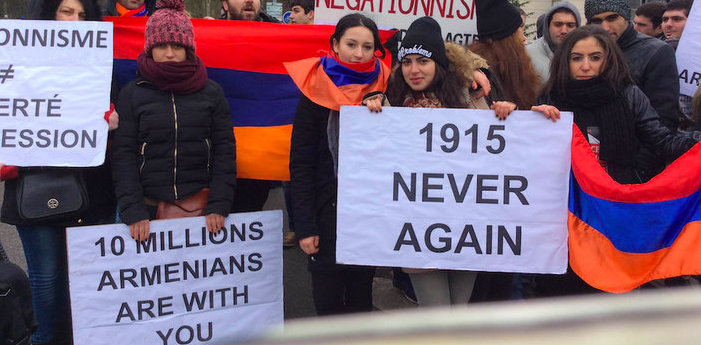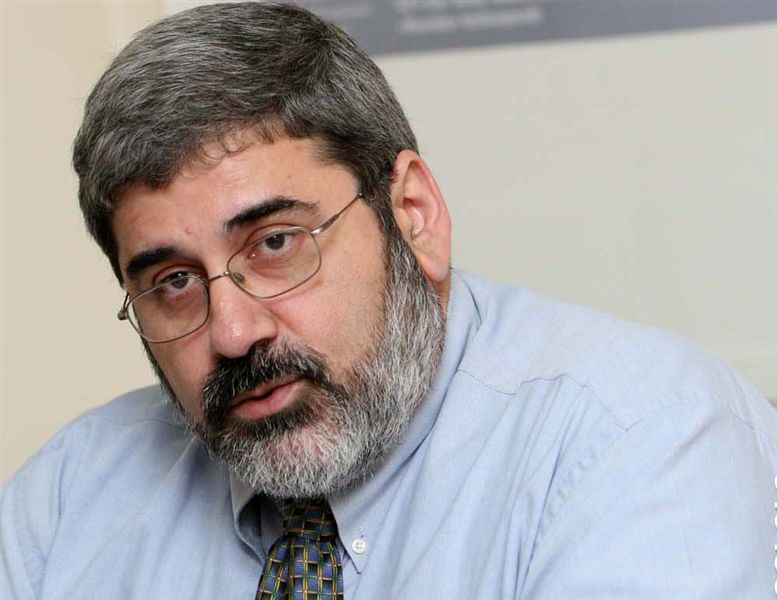Ermenistan bardağın dolu tarafına bakıyor


‘Perinçek-İsviçre’ davasının ardından, davaya üçüncü taraf olarak katılan Ermenistan’ı temsil eden iki insan hakları avukatı Amal Clooney ve Geoffrey Robertson QC, Avrupa İnsan Hakları Mahkemesi’nin davayla ilgili kararına ilişkin, “Avrupa İnsan Hakları Mahkemesi’nin, Doğu Perinçek ile İsviçre arasındaki davaya müdahil olan Ermenistan hükümeti adına sunduğumuz argümanları onaylamış olmasından dolayı, mutluluk duyuyoruz. Karar, Ermenistan için bir zaferdir” şeklinde konuşmuştu.
Ermenistan ve Diaspora’dan gelen yorumların çoğu, kararın “olumlu” tarafıyla ilgili. Fakat yine de davanın Ermeniler için neden ‘zafer’ anlamına geldiğini anlamak zor. Avukatların ‘zafer’ yorumlarını aratmayacak bir açıklama da çok kısa süre sonra Ermenistan Başsavcılığı Basın Dairesi’nden geldi. “Perinçek davasında Avrupa Mahkemesi, Ermenistan hükümetinin bütün taleplerini tatmin etti” başlıklı açıklamada, şu ifadelere yer verildi: “Davaya katılan Ermenistan, AİHM’den, kararında Ermeni Soykırımı’nı kuşku altına alacak herhangi bir ifadeye yer verilmemesi talebinde bulunmuştu. Kararda, mahkemenin 1915 yılında Ermeni halkının maruz kaldığı kitlesel katliamlar ve tehcirin, soykırım olarak nitelenip nitelenmemesi konusunu tartışmadığı kaydedildi. İsviçre yasalarının Perinçek davasında yanlış uygulandığını, yani Ermeni Soykırımı’nın inkârının cezalandırılmasının hukuka uygun olduğu, ancak, yasanın Avrupa Sözleşmesi çerçevesinde uygulanması gerekliliği kaydedildi. Sonuçta, Ermeni hükümetinin AİHM’e yönettiği bütün talepleri kabul edildi”.
“En kötü sonuç değil”

Taşnaksütyun Partisi’nden Giro Manoyan, davanın sonucuyla ilgili olarak “En iyi sonucu duymadığımız gibi, en kötü sonuçla da karşılaşmadık” dedi. “Önemli olan, mahkemenin konsensus ile Perinçek’in tazminat isteğini reddetmesidir. Ayrıca, 17 savcıdan 7’si farklı düşünüyorlardı. En önemlisi, soykırımın gerçekleştiği topraklarda soykırımın inkâr edilmesinin cezai yaptırımları konusunun önü kesilmemiştir. Dolayısıyla, farklı ülkelerin hâlâ bu tip kanunlar çıkarabilecek şansı var” şeklinde konuşan Manoyan da davanın olumlu sonuçlandığını düşünenlerden.
Ermenistan Bilimler Akademisi Soykırım Çalışmaları Bölümü Başkanı Armen Marukyan ise alınan kararın önemli bir anlamı olduğunu düşünmekte. “AİHM’nin ilk kararında, Ermeni Soykırım gerçeğini kuşku altına alan noktalar vardı ve bu kuşku ile Perinçek’in ifade özgürlüğünü koruma konusu arasında bir bağ oluşturulmaya çalışılıyordu. Bu durum, çok tehlikeliydi. Ermeni Soykırımı’nın uluslararası alanda kabulüne zarar verebilirdi. Ama alınan son kararla, bu tehlike ortadan kalkmış oldu” diyor.
Açık olan o ki, Ermenistan kabul etse de etmese de Perinçek, Ermeni Soykırımı’nın inkârını suç sayan ilk ülke olan İsviçre’yi, bu davayla mağlup etmiş oldu. Türkiye Dışişleri Bakanlığı ve Ermenistan Başsavcılığı, davanın sonucuyla ilgili memnuniyetlerini açıkça ifade ettiler. Türkiye, Ermenistan ve Azeri basını, dava sonucunu büyük bir mutlulukla yer verdiler. Herkes, kararın kendisi için iyi olan tarafını görmeye çalıştı.
Fakat Ermensitan’da davanın yorumu, biraz da iç siyasi dengeler gözetilerek yapılıyor. Bugüne kadar, İsviçre dışında inkârı suç sayan sadece iki ülke Slovakya ve Yunanistan bulunuyordu. Bu davanın sonucunda, artık soykırımın inkârını suç sayacak tasarıların farklı ülkeler tarafından kabul edilmesinin zor, hatta imkânsız olduğu da bir gerçek. Bu durum, soykırımın kabulüyle ilgili çalışmaları olumsuz etkileyebilir.
Sert eleştiriler de var
Davanın en çarpıcı sonuçlarından biri de Holokost ile Ermeni Soykırım’ı arasında ayrım yapılmış olması. Ermenistan otoritelerinin veya dünyanın farklı yerlerindeki Ermeni uzman ve gazetecilerin birçoğunun görmediği ya da görmek istemediği bu gerçek, Türkiye Dışişleri tarafından görüldü ve özellikle altı çizildi: “Karara göre, 1915 olayları meşru bir tartışma konusu olup, bu tarihte yaşananlara ilişkin farklı görüşler, ifade özgürlüğünün koruması altındadır. Ayrıca, 1915’te yaşananların Holokost ile karşılaştırılması da asla mümkün değildir.”
Ermenistan Anayasa Mahkemesi Savcısı Vladimir Hovhanisyan, farklı düşünenlerden. AİHM’nin son dönemde aldığı kararların objektiflikten uzak olduğunu ve bunu özelikle Rusya Federasyonu ile ilgili davalarda gözlemlediklerini belirtiyor. Hovhanisyan, “Tek cümleyle özetlemem gerekirse, AİHM’in kararı, taraflı ve rezil bir karadır. Uluslararası siyasi arenanın bir aynasıdır artık AİHM” diyor.
Uluslararası hukuk uzmanı Ara Ğazaryan, bu sonucun Ermeni Soykırımı’nın dünyada kabulü meselesiyle herhangi bir bağlantısı olduğuna inanmıyor. Mahkemenin kararında Türk lobilerinin parmağı olduğunu düşünen Ğazaryan, “Bu dava, soykırımın inkârını suç sayan yasa tasarılarının artık kabul edilmeyeceği anlamına gelebilir. Soykrım kabul edilir, fakat cezai uygulamaya gidilmez” dedi.
Türkiye’yi yakından takip eden gazeteci Andranik İspiryan, kararın AİHM için büyük bir ayıp olduğunu, Türkiye’nin faşist ve inkârcı siyasetini desteklemesi açısından ise tehlikeli olabileceğini belirtiyor. İspiryan, “Türkiye’de davadan sonraki haberlere bakın. Perinçek’in zaferi, ‘soykırım yalanına’ vurulan bir darbe şeklinde gazetelerin manşetlerine taşındı. AİHM, bunları görmüyor mu?” diye soruyor.


